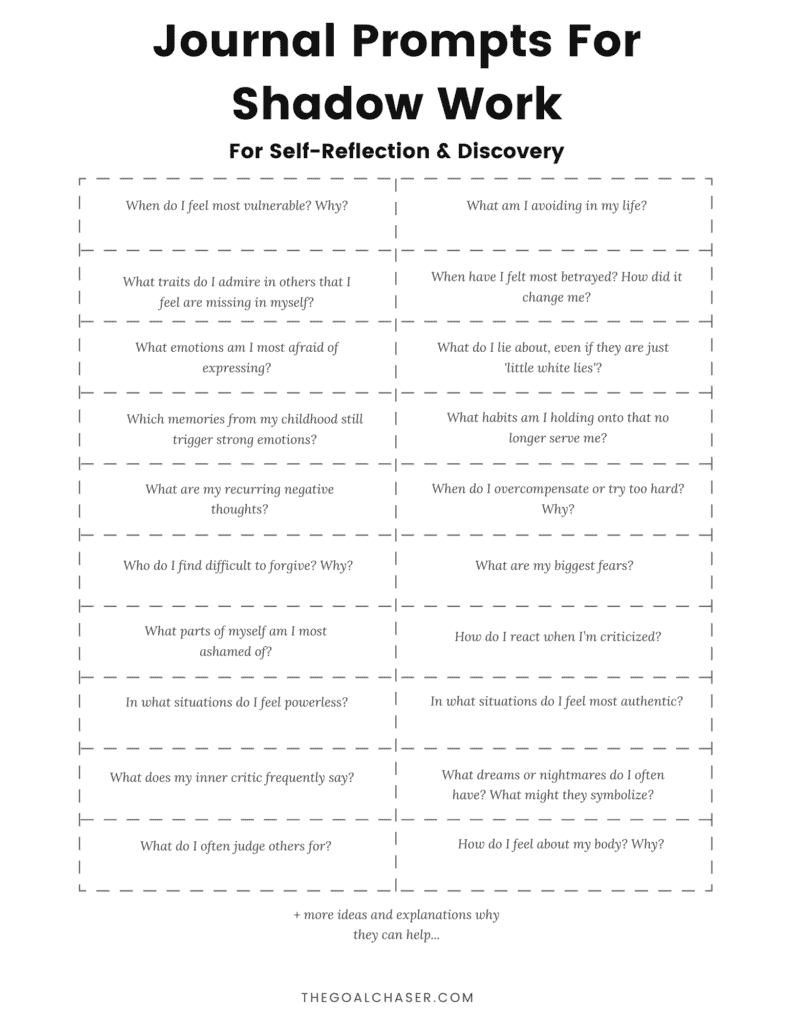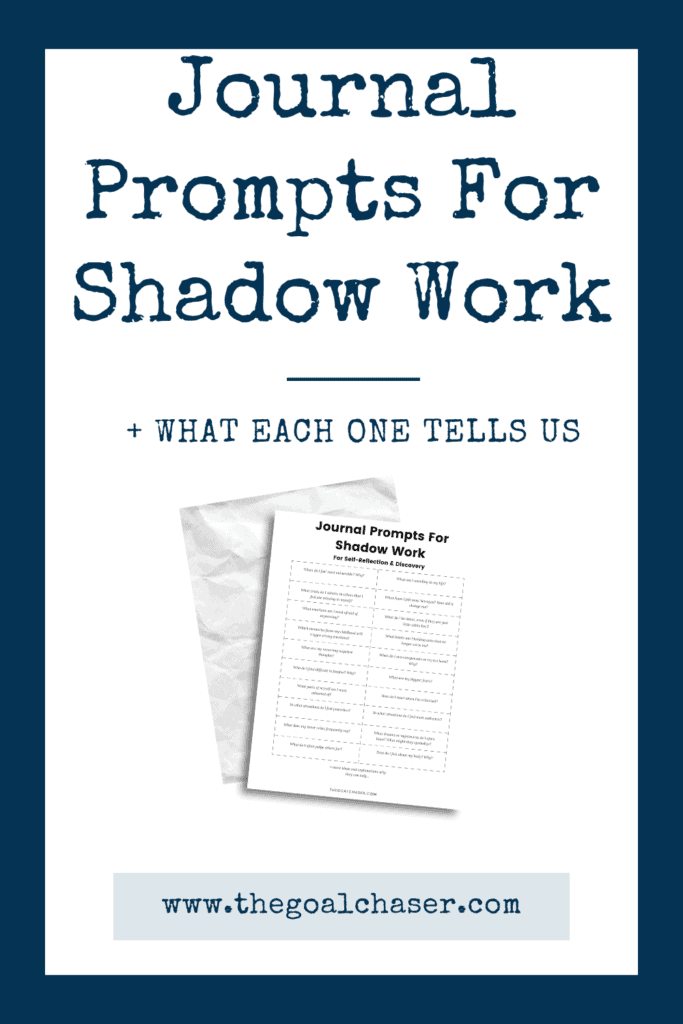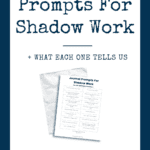45 Journal Prompts For Shadow Work (+What Each One Tells Us)
A list of journaling prompts around the concept of ‘shadow work’.
Shadow work is a transformative process of self-reflection and discovery, aiming to uncover and integrate the hidden and repressed parts of our psyche.
Coined by Carl Jung, the term “shadow” refers to those parts of ourselves we choose to ignore, deny, or suppress, because they contain traits, memories, or desires we deem negative or undesirable.
Jung believed that by confronting our shadow, we can better understand the roots of our behaviors, heal past traumas, and move towards a more authentic life.
Benefits of Shadow Work Journaling
Journaling is a powerful tool for doing your own, personal shadow work.
By putting pen to paper and diving deep into our thoughts and feelings, we can access and confront the hidden aspects of our inner self. The benefits of journaling for shadow work can include:
- Greater self-awareness: writing candidly about our experiences helps bring clarity to our feelings and patterns.
- Emotional healing: articulating our wounds and traumas can be cathartic, initiating the healing process.
- Integration: by acknowledging our shadow, we can integrate these aspects, leading to greater wholeness and authenticity.
- Problem-solving: recognizing and understanding our triggers and reactions can provide insights into navigating challenges.
*A Word of Caution: While journaling for shadow work can be profoundly healing for many, it’s essential to recognize your limits. If you find that diving into these prompts triggers overwhelming emotions or distressing memories, it is best to pause and seek support. Shadow work is not a substitute for professional therapy. For those dealing with trauma, depression, or other mental health challenges, it’s crucial to approach such introspection under the guidance of a mental health professional or to prioritize getting help and support first. Remember, it’s okay to seek help; prioritizing your mental well-being is a sign of strength and self-care.*
Shadow Work Prompts
Embarking on shadow work is a profound journey towards self-understanding and healing.
Using these prompts as a guide, journaling can be your compass, leading you through the intricate landscapes of your psyche.
- When do I feel most vulnerable? Why? Uncovering vulnerabilities can lead to understanding suppressed emotions and triggers.
- What traits do I admire in others that I feel are missing in myself? This often reflects qualities we’ve denied in ourselves.
- What emotions am I most afraid of expressing? Helps identify suppressed feelings.
- Which memories from my childhood still trigger strong emotions? Childhood memories can shed light on root causes of current behaviors.
- What are my recurring negative thoughts? Recognizing these patterns can be the first step towards changing them.
- Who do I find difficult to forgive? Why? Understanding resistance to forgiveness reveals deep-seated emotions and traumas.
- What parts of myself am I most ashamed of? Confronting shame can lead to acceptance and healing.
- In what situations do I feel powerless? Reveals underlying fears and insecurities.
- What does my inner critic frequently say? Acknowledging the critic can diminish its power over us.
- What do I often judge others for? Our judgments often mirror what we reject in ourselves.
- What am I avoiding in my life? Avoidance indicates areas needing attention and reflection.
- When have I felt most betrayed? How did it change me? Understanding past betrayals can lead to healing and growth.
- What do I lie about, even if they are just ‘little white lies’? Recognizing dishonesty can reveal hidden fears or desires.
- What habits am I holding onto that no longer serve me? Understanding harmful patterns allows us to break free from them.
- When do I overcompensate or try too hard? Why? This highlights areas of insecurity or lack of authenticity.
- What are my biggest fears? Confronting fears can lead to understanding and resolution.
- How do I react when I’m criticized? Our reactions often reveal hidden sensitivities or wounds.
- In what situations do I feel most authentic? Recognizing authenticity can help integrate the shadow.
- What dreams or nightmares do I often have? What might they symbolize? Dreams can provide insights into our subconscious.
- How do I feel about my body? Why? Body image issues often connect with deeper insecurities or traumas.
- What were the negative messages I received growing up? Childhood messages can influence adult behaviors and beliefs.
- How do I sabotage myself? Recognizing self-sabotage can lead to personal growth and change.
- When do I seek validation from others? This reveals areas of insecurity and a need for external approval.
- What are my defense mechanisms? Understanding our defenses can lead to deeper self-awareness.
- In what ways do I feel unlovable? Confronting feelings of unworthiness can lead to greater self-acceptance.
- What are my deepest regrets? Reflecting on regrets can offer lessons and healing opportunities.
- Which parts of my past am I unwilling to revisit? Avoided memories often hold significant insights.
- What triggers my anger or resentment? Understanding triggers can reveal suppressed emotions.
- How do I cope with stress or pain? Are these methods healthy? Assessing coping mechanisms can inspire positive change.
- What aspects of myself am I hiding from others? Acknowledging hidden selves can lead to integration and authenticity.
- What are the roles I play in different settings (family, work, social)? Are they true to who I am? Recognizing roles can lead to authentic living.
- What expectations do I place on myself? Are they realistic? This reveals potential sources of internal pressure and self-judgment.
- When have I felt most misunderstood? Why? Reflecting on these moments can offer insights into communication and perception.
- What secrets am I holding onto? Revealing secrets, even just on paper, can lighten emotional burdens.
- How do I react when my boundaries are crossed? Understanding reactions can lead to stronger boundary setting.
- What are the stories I tell myself when I fail? Changing these narratives can shift self-perception.
- In which situations do I feel out of control? Reflecting on these situations can offer insights into underlying fears.
- How do my closest relationships mirror aspects of myself? Relationships often reflect both our light and shadow.
- What do I believe I deserve in life? Exploring beliefs about worthiness can impact life choices and happiness.
- What are my non-negotiable values? Have I ever compromised them? This delves into personal integrity and moments of divergence.
- What do I envy in others? Envy can highlight unmet desires or suppressed parts of ourselves.
- How do I want to be remembered? Contemplating legacy can lead to insights about authentic living.
- What situations make me defensive? Understanding defensiveness can reveal hidden insecurities.
- When do I feel most isolated or alone? Exploring loneliness can provide insights into connection and belonging.
- How do I deal with rejection? Reactions to rejection can reveal core beliefs about self-worth and acceptance.

Remember to be kind on yourself, embrace the journey, and remember that confronting the shadow paves the way for light.

You may also like:






